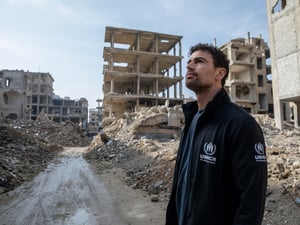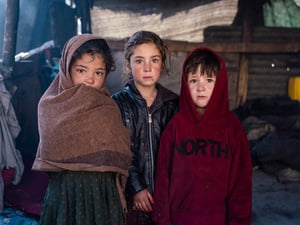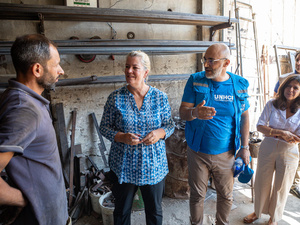Poor conditions in Iraq drive returned refugees back to Syria
Poor conditions in Iraq drive returned refugees back to Syria

An unidentified Iraqi family at a Syrian immigration post on the border with Iraq.
DAMASCUS, Syria, December 21 (UNHCR) - Omar Salman's* Syrian visa expired two weeks ago. A refugee from neighbouring Iraq, he believes his family's residency permits will not be renewed but says that returning to Iraq is not an option.
Travelling to Jordan, which also hosts a significant number of Iraqi refugees, is also not possible. After overstaying his visa in 2006, he has been barred from entering the country for another five years.
"I'll pitch a tent on the border if they won't let me stay, but I will never return to Iraq," he says, surrounded by his wife Shahla* and three children.
The Salmans have already made one attempt to return home. In October 2008, they boarded an Iraqi government chartered flight alongside some 50 other families bound for Baghdad.
"I expected when I returned to Iraq that I would be able to at least build a small house for my children, 50 square metres. So that when I die they'll be able to say: bless our father, he left us this room," says Omar.
But that didn't happen. The $150 travel assistance received from UNHCR only covered half of their taxi fare to their parents' house in Abou Ghraib, a city west of Baghdad. Omar got occasional low wage work as a blacksmith, his wife, a Shia, says she was constantly harassed by residents in their majority-Sunni neighbourhood. His children were too afraid of kidnappings to go to school, and he was detained for 45 days after an attack occurred on a vehicle in his area.
"The Iraqi Government had placed huge advertisements around our neighbourhood in Damascus encouraging refugees to return. They promised returnees cash grants and help finding employment. We were destitute in Syria and we hoped the assistance would help us rebuild our lives back home. When we arrived in Iraq, none of that materialised," says Shahla.
When Omar went to collect the US$ 1,000 he had been promised by Iraqi officials, he was turned away and told that because he and his family had left Iraq in 2005, before the outbreak of sectarian violence, they did not qualify for return assistance.
The Salmans were displaced from Kirkuk in 2003. They lived in a bombed out building without doors or windows and then in a makeshift camp in Diyala with no running water or electricity for almost two years before leaving the country. In Jordan their status was illegal, and in Syria they could barely make ends meet.
Now, with the renewal of their residency permits uncertain, they may be forced to leave Syria. The family says they will stay were they are.
"We are tired, tired of running," says Omar.
In view of the ongoing violence, serious human rights violations and continuing security incidents, primarily in the five central Governorates of Iraq, UNHCR does not consider that conditions are appropriate for the large-scale return of refugees to those areas.
According to a recent UNHCR returns monitoring survey, the main concerns of refugees upon return to Iraq are general insecurity, insufficient public services, and lack of employment opportunities.
The office of UNHCR in Baghdad is aware of 32,550 refugees who, as of October 31 of this year, had returned to Iraq. This represents a slight increase over 2008, when 25,370 individuals repatriated.
* Names have been changed
By Farah Dakhlallah in Damascus, Syrian Arab Republic







